
Naming every expedition participant in a telepresence-enabled mission is next to impossible! Many from dozens of institutions across the country have provided input into the expedition plan and are expected to participate. However, we've assembled information about the members of the science and remotely operated vehicle teams who are physically onboard NOAA Ship Okeanos Explorer, and whose voices you are likely to hear most often when watching the live video.
And of course, none of this exploration would be possible without the work of the dedicated NOAA Commissioned Officer Corps and civilians who operate NOAA Ship Okeanos Explorer as part of NOAA's fleet managed by NOAA's Office of Marine and Aviation.
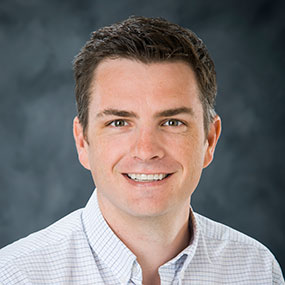
Co-science Lead
Assistant Professor of Geology
Mississippi State University
Dr. Adam Skarke is an Assistant Professor of Geology at Mississippi State University where he conducts research in the fields of marine geology and geophysics. The goal of his research is to better understand fundamental physical relationships between sediment transport, morphological expression, stratigraphy, and subsurface fluid flow in seafloor environments that span the continental margin from coastal waters to the deep sea. Adam’s recent work has focused on using geophysical mapping tools, such as multibeam sonar, to detect deep-sea methane gas seeps, quantify discharge rates, and characterize associated benthic habitats. He has participated in 24 oceanographic research cruises and utilized human occupied submersibles, remotely operated submersibles, and autonomous underwater vehicles to conduct seafloor and water column exploration. From 2011-2013, Adam was a member of the Okeanos Explorer Mapping Team. In 2016, Adam was named an Early Career Research Fellow by the National Academies of Sciences, Engineering, and Medicine, Gulf Research Program. For additional information please visit: http://www.adamskarke.com
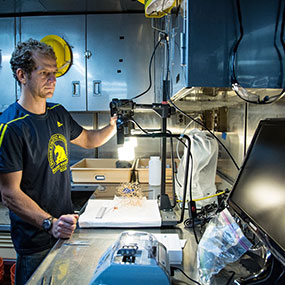
Co-science Lead
Research Coordinator
Southeast Deep Coral Initiative at JHT Inc./NOAA National Centers of Coastal Ocean Science
Dr. Daniel Wagner is serving as the expedition's onboard science co-lead and works as the research coordinator for the Southeast Deep Coral Initiative (SEDCI) at JHT Inc./NOAA National Centers of Coastal Ocean Science (NCCOS). Daniel has conducted research on deep-sea corals since 2006, and has participated in over 25 expeditions that have surveyed deepwater ecosystems throughout the Indo-Pacific, Atlantic and Southern Oceans. His research interests include the taxonomy, life history, and ecology of deep-sea corals, particularly black corals. Daniel received his Ph.D. and M.S. in biological oceanography from the University of Hawaii and a B.S. in Biology from Hawaii Pacific University. Daniel is originally from Ecuador, but resides in Charleston, South Carolina.
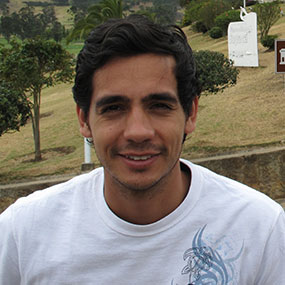
Global Foundation for Ocean Exploration
Fernando graduated from the University of Hawaii at Manoa with a B.S. in Mechanical Engineering. During his studies, he had experience in several fields including conceptual design, aerospace research, mechanical design, robotics and software development. From these activities he was able to intern for NASA at the Jet Propulsion Laboratory, present research in a national conference, and even coauthor a technical paper in the Journal of the Astronautical Sciences. His most recent position was at the Field Robotics Laboratory (FRL) where he helped support operations, testing and software development for two unmanned surface vehicles. From his time in FRL, he discovered a true passion for development and design of robotic systems. Originally from Colombia, Fernando enjoys outdoor activities and currently resides in State College, Pennsylvania.
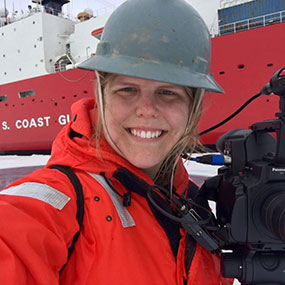
Video Producer
Global Foundation for Ocean Exploration
Caitlin Bailey holds a B.S. in Animal Biology from Texas A&M University-Corpus Christi and a MFA in Science and Natural History Filmmaking from Montana State University. Her scientific background includes fieldwork with sea otters in Alaska, lab research on wild mice vocalizations, and mentoring undergraduate students in biology. She also volunteered with the Texas Marine Mammal Stranding Network and the Second Chances Wildlife Rehabilitation Program at the Texas State Aquarium. In pursuit of her filmmaking career, Caitlin held a writing and film internship at NASA Goddard Space Flight Center and worked as a camera operator and stage manager with Montana PBS. She was also a video engineering intern onboard the E/V Nautilus. Caitlin was the web coordinator and video producer on the NOAA Hidden Ocean 2016: The Chukchi Borderlands expedition. She started with NOAA Ship Okeanos Explorer in April 2016 and loves nothing more than being at sea. When on land, Caitlin resides in San Antonio, Texas, where she enjoys photography, SCUBA diving, camping, and volunteering for TEDx events.
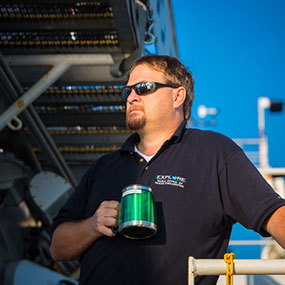
Electronic Systems Engineer
Global Foundation for Ocean Exploration
Roland Brian brings 29 years of experience and a keen eye for precision HD video to the program as a video/satellite and telepresence engineer. Roland began his career in the U.S. Air Force where he worked as a Satellite Communications Engineering Technician with visions of working on the U.S. Space Station. He traded in that quest for one of deep-ocean exploration and sharing beautiful imagery with the world. He has worked with the NOAA Office of Ocean Exploration and Research (OER) and the Okeanos Explorer Program since 2009 and has been engaged in every telepresence-enabled remotely operated vehicle (ROV) expedition. He has also provided services for other projects using OER’s mobile telepresence system, including the 2012 Ring of Fire Expedition. His duties aboard NOAA Ship Okeanos Explorer include operation and maintenance of the ship's Telepresence and video systems, including on ROV Deep Discoverer and the Seirios camera platform. Again, Roland’s experience embodies the breadth and depth of knowledge the OER program encourages. When not fine-tuning the video and telepresence systems or training and mentoring new team members, he's actively involved in the editing process of our ever-expanding ocean exploration video library. While not at sea, Roland enjoys life with his wife and family in sunny Sarasota, Florida.
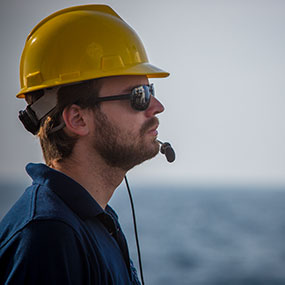
Mechanical Engineer
Global Foundation for Ocean Exploration
Joshua Carlson attended the University of Massachusetts, Dartmouth, where he received a B.S. in Mechanical Engineering with minor in Business Administration. He went on to receive his M.S. in Marine Observation Technology from the University of Massachusetts, Dartmouth School for Marine Science and Technology. Josh has a diverse background, encompassing the use of autonomous underwater vehicles (AUVs) and other types of ocean observation platforms for the purpose of studying ocean turbulence. He has designed and built a deep-ocean camera platform for filming deep-water krill in the Antarctic Ocean and provided mechanical engineering and software capabilities on the Woods Hole Oceanographic AUV Sentry during a recent cruise aboard the NOAA ship Okeanos Explorer. In his current position with NOAA’s Ocean Exploration program, Josh provides engineering, programming, and at-sea support, acting in the capacity of navigator, pilot, and co-pilot for NOAA’s 6000-meter-rated remotely operated vehicle system, Deep Discoverer. His broad range of skills in both engineering and software control development makes him an invaluable member of our team. When not traveling, Josh resides in Fairhaven, Massachusetts.
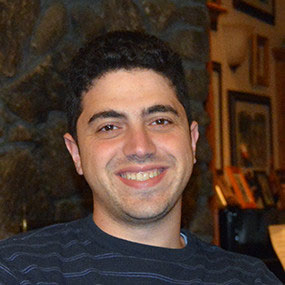
Electrical Engineer
Global Foundation for Ocean Exploration
David Casagrande holds a B.S. and M.S. in Ocean Engineering from the University of Rhode Island, completing his masters in 2013 with a focus on robotic instrumentation and computer vision. As a student, he worked on an autonomous profiling and imaging platform used for fisheries habitat assessments and counts. Since graduating, he has worked on a range of autonomous profiling and surface vehicles, measuring chemical and physical properties of the water, sonar mapping, and sea floor imaging. He has sailed on a number of research cruises to support and operate these vehicles. David also worked on underwater stereo camera systems, both standalone and ROV-based. Improving the calibration of these camera systems, required for accurate 3D reconstruction and measurements, continues to be an interest.
When not at sea, he lives in South Kingstown, Rhode Island.
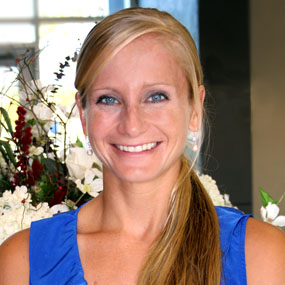
Sample Data Manager
NOAA National Centers for Environmental Information
Lauren Jackson holds a B.S. in Fisheries and Allied Aquacultures from Auburn University and an M.S. in Coastal Sciences from the University of Southern Mississippi’s Gulf Coast Research Lab. Lauren is a Data Content Manager for coastal environmental data at the NOAA National Centers for Environmental Information (NCEI) at Stennis Space Center, Mississippi. Prior to joining NCEI, Lauren was a Fisheries Biologist at the NOAA Southeast Fisheries Science Center’s Mississippi Lab working on the Deepwater Horizon oil spill response and National Marine Fisheries Service stock assessments and as an ichthyoplankton taxonomist. Lauren enjoys being on the water and has participated in NOAA Fisheries sampling cruises in the Gulf of Mexico on NOAA Ships Oregon II and Gordon Gunter.
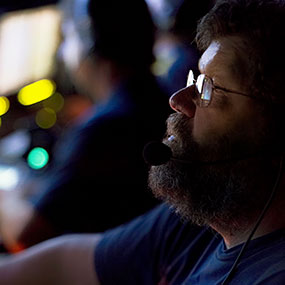
Global Foundation for Ocean Exploration
Bob has almost 50 years’ experience in broadcast engineering. Following a 37-year career with RIPBS, departing in 2006 as Chief Engineer, he worked for the Sea Research Foundation and Ocean Exploration Trust as the Senior Broadcast Engineer. He was responsible for the design, commissioning, and maintenance of the Inner Space Center located at the University of Rhode Island Graduate School of Oceanography. He also worked on many research vessels and supported telepresence operations from NOAA Ship Okeanos Explorer, E/V Nautilus, R/V Endeavor, and R/V Atlantis, plus many other UNOLS ships.
Bob is married and has six adult children, nine grandchildren, and a great-grandson. He and his wife Donna play French horn and are active in many community music ensembles in Rhode Island.
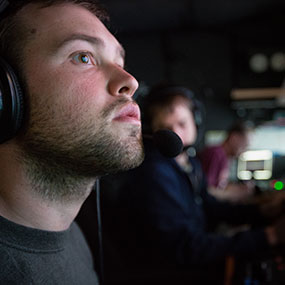
Electrical Engineer
Global Foundation for Ocean Exploration
Jeff Laning holds a B.S. in Electrical Engineering from the University of Vermont. He started his career as an intern with Greensea Systems, Inc., where he worked on design, development, and integration of components and software associated with remotely operated vehicles and autonomous underwater vehicle systems.
Jeff is one of our youngest members and came to our group with a desire to learn new and complex electrical systems. Electrical engineers interested in and capable of working on deep submergence systems are one of the hardest positions to fill. Jeff has done a great job as a key member of the team that built Deep Discoverer and has become a skilled pilot, co-pilot, and navigator. His contribution to ocean exploration is certainly something to be proud of and we hope that other young engineers will be inspired by what he has accomplished. Jeff currently resides in Vermont.
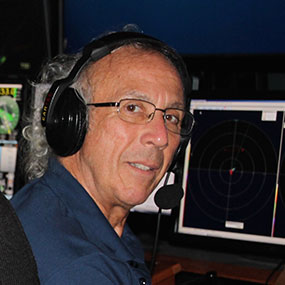
Global Foundation for Ocean Exploration
Don Liberatore has more than 35 years of experience in manned and unmanned submersible operations as a diver-medic, mixed gas lock-out diver and hyperbaric chamber operator and Chief Submersible Pilot for Harbor Branch Oceanographic Institution’s Johnson-Sea-Link I & II research submersibles. He has logged nearly 1,800 dives as a pilot, hundreds more as a pilot-trainer, and over 200 as a mixed gas lock-out diver to 350 feet.
In addition to science missions, he has participated in recovery operations as Submersible Operations Coordinator. These include the search and recovery of the Space Shuttle Challenger, excavation and documentation of the U.S.S. Monitor, documentation of the wreck of the S.S. Edmund Fitzgerald, and the search for the wreckage of Amelia Earhart’s plane in the central Pacific Ocean using two REMUS 6,000 meters autonomous underwater vehicles.
He has worked as crew member and/or project manager for the Kraken (UCONN), Mohawk (UNCW) and Global Explorer (DSSI/Oceaneering Int.) ROVs. He is participating in this expedition as a member of the Deep Discoverer crew.
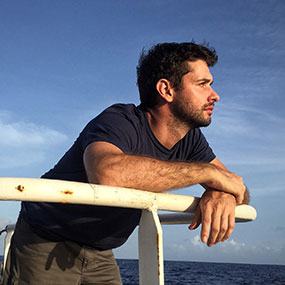
Mechanical Engineer
Global Foundation for Ocean Exploration
Andy earned a Bachelor's in Ocean Engineering from Texas A&M. He then obtained a Master's in Mechanical Engineering focusing on Robotic Artificial Intelligence and Systems Engineering from Embry Riddle in Daytona Beach. After college, he lent his knowledge to the oilfield service industry for four years, living in various places including Wyoming, North Dakota, and Alaska while on assignment. Recently, he has come back to the mechanical and software side of engineering to contribute to the team at the Global Foundation for Ocean Exploration. He loves traveling, exploring, and being outdoors.
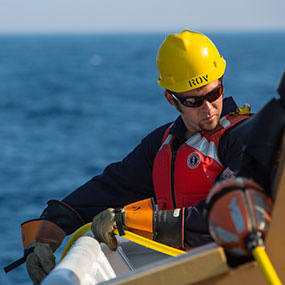
Ocean/Mechanical Engineer
Global Foundation for Ocean Exploration
Karl McLetchie is a graduate of the Massachusetts Institute of Technology. He holds B.S. and M.S. degrees in Ocean and Mechanical Engineering. After graduating, he worked as an engineer on the development of autonomous underwater vehicles and as a naval architect on the design of high-speed aluminum vessels. After a brief, two-year stint of delivering sailboats around the Caribbean, he started his own contracting company, SeaKnowledge, in 2008. Through SeaKnowledge, Karl works on the mechanical design and operation of underwater vehicles. Karl has worked on Okeanos Explorer for six seasons, in all positions on the ROV Team from Winch Operator to Dive Supervisor. When not on assignment for Ocean Exploration, Karl resides in Pemaquid, Maine.
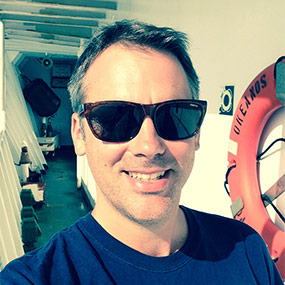
Mapping Technician
Jason Meyer first pursued his passion for seafloor exploration while earning a B.S. from the University of Hawaii Hilo in Geology studying volcanic processes along the Hawaiian Islands. He would later go on to receive his M.S. in Geology from the University of South Carolina focusing on regional mapping and classification of seafloor volcanoes along the East Pacific Rise and the Galapagos Spreading Center in the Pacific Ocean.
After graduating in 2006, Jason has worked as a hydrographer mapping the coast, rivers, reservoirs, and lakes along the west coast from Mexico to Alaska and Hawaii. He has endured long hours and challenging conditions at the helm collecting data that serves maritime navigation and construction, environmental studies, and academic exploration. Since dedicating his career to hydrography, Jason continues to be driven by curiosity and the challenge of the unknown depths.
This will be Jason’s second season working on the Okeanos Explorer as a mapping technician. While not at sea, he enjoys climbing, surfing, and backpacking with his family in Battle Ground, WA.
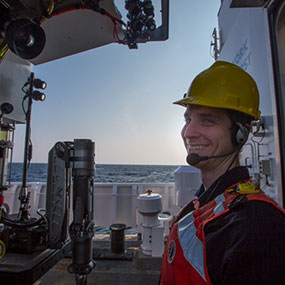
Systems/Robotics Engineer
Global Foundation for Ocean Exploration
Bobby Mohr is a Systems/Robotics Engineer, specializing in autonomous and remotely operated underwater vehicles. He holds a B.S. in physics and graduated cum laude from Davidson College in 2009. Bobby started his career as an engineering technician with Greensea Systems where he was responsible for the design, development, and testing of autonomous underwater vehicle control systems. Like many of our engineers, Bobby realized that he would enjoy the design-build process more if he was able to also pursue the challenges of making vehicles work successfully at sea.
After serving on several projects at Greensea where he specialized in electrical and software systems support, Bobby joined the Ocean Exploration program as an electrical systems engineer. During his time at Greensea and now with NOAA, he has been one of the key electrical engineers on the development of our 6000-meter-rated remotely operated vehicle system, Deep Discoverer and Seirios. Like many of our engineers, he has multiple skills and is a tremendous asset to our program.
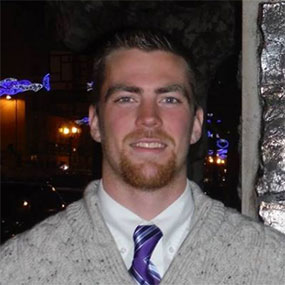
Ocean/Mechanical Engineer
Global Foundation for Ocean Exploration
Lars Murphy is an Ocean/Mechanical Engineer for the Global Foundation for Ocean Exploration. He holds a B.S. in Ocean Engineering and a B.A. in Spanish from the University of Rhode Island. Growing up on the coast of Maine, he developed a constant pull towards the unknown, the unexplored, and chaotic environments – and acquired a drive to bring meaning, understanding, and order to these areas. Lars has a professional background working with AUVs and other subsea robotics systems both internationally and nationally and now supports ROVs Deep Discoverer and Seirios.
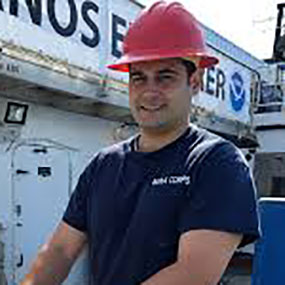
Expedition Coordinator
NOAA Office of Ocean Exploration and Research
LT Nick Pawlenko joins OER as Expedition Operations Leader. Nick is rotating to land after three field seasons aboard NOAA Ship Okeanos Explorer. During his time aboard the Okeanos Explorer, Nick was able to work with the ROV team, often sitting in as ROV navigator and co-pilot.
Nick graduated from the University of Pittsburgh with a Bachelor of Science in Mechanical Engineering and a Masters in Business. He also recently completed MIT’s Professional Education program Rapid Robotics: Autonomous Systems with Open Source Software.
Prior to joining NOAA, Nick was very involved in the Pittsburgh community and served on the Board of Directors and as Treasurer for the Oakland Business Improvement District for many years. While in Pittsburgh, he also remodeled residential and commercial real estate and was involved in the bar and restaurant business.
Nick is very excited to continue his work with OER and be an asset to the team in his new land assignment.
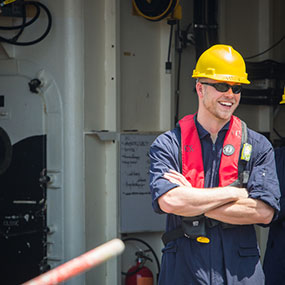
Ocean Engineer
Chris first joined our group on the Cayman Rise Expedition in 2011, just prior to being hired full time by NAVSEA. Since then, an informal NAVSEA-NOAA relationship has allowed Chris to continue to participate in our design, engineering, and offshore operations. Chris holds a B.S. in Ocean Engineering and a B.S. in Aerospace Engineering from Virginia Tech with a minor in mathematics. He is currently working on his M.S. in Ocean Engineering at Virginia Tech and expects to complete that program in 2015. Chris has been a major contributor to our design-build process and a tremendous asset to our offshore operations. He is a skilled navigator, pilot, and co-pilot of our vehicles and brings with him a level of enthusiasm that everyone around him appreciates and respects. The Office of Ocean Exploration and Research is very lucky to have his participation and we applaud NAVSEA for their insight, training, and willingness to share great talent. Chris resides in Arlington, Virginia.
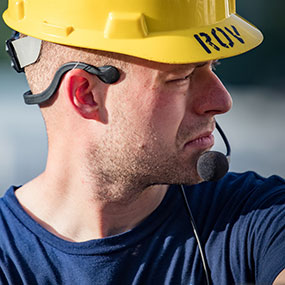
ROV Engineer
Global Foundation for Ocean Exploration
Dan Rogers has a diverse background in engineering, media production, and education. Daniel holds a B.S. in Physics and earned a M.S. in Mechanical Engineering from the University of Hawaii in 2013. Before starting his graduate program, Daniel worked as a Science Educator at the Bishop Museum in Honolulu. He continued to work with the museum as a Digital Media Producer while in school, partnering with the Polynesian Voyaging Society to produce a 30-minute film about traditional sailing and star navigation for the fulldome planetarium format. He has now been working as an ROV engineer and videographer on the Okeanos Explorer for over four years.
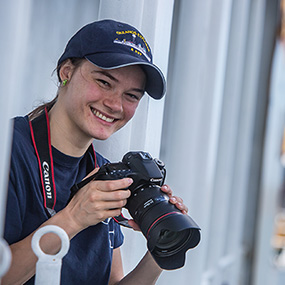
Producer
Global Foundation for Ocean Exploration
Tara Smithee has been sailing on Okeanos Explorer expeditions since 2012 as a producer, editor, and ROV camera operator. She holds a Masters in Ocean Systems from Stanford University and is pursuing a second Masters in Science and Natural History Filmmaking from Montana State University. Tara has a tremendous interest in science and exploration and amazement for the natural world. She is an avid scuba diver and one of her most treasured marine memories was swimming with dolphins in the wild. When not at sea, she enjoys dancing and writing in Portland, Oregon.
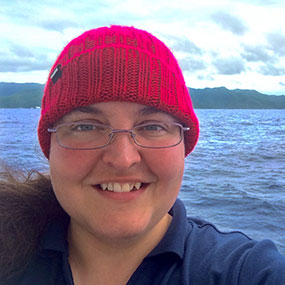
Video Producer
Global Foundation for Ocean Exploration
Annie White is an award-winning documentary filmmaker, photographer, and biologist who specializes in conservation biology and animal behavior. She holds a B.A. in Environmental, Population and Organismic Biology from the University of Colorado, and is currently finishing an MFA degree in Science and Natural History Filmmaking at Montana State University. Her career has taken her from collecting dinosaur fossils, to studying wild wolves, to filming cougars, grizzly bears, and now, deep-sea creatures. The years she spent living and traveling with captive ambassador wolves kick-started Annie’s interest in science education and inspired her to reach out to larger audiences through film. Her credits include projects for NOAA, BBC, National Geographic WILD, Travel Channel, Curiosity Stream, and various non-profit groups. In all of her work, Annie endeavors to bring together science, wildlife conservation, and compelling narratives to spark wonder and draw audiences into the lives of real animals. When not at sea, Annie loves to travel, write, and look for any excuse to get out into the natural world.
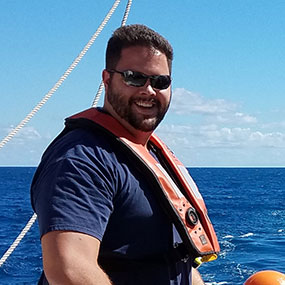
Mapping Lead
NOAA Office of Ocean Exploration and Research
A native of Long Island, New York, Mike took a deep interest in ocean science at a young, age growing up in and on the water. After graduating from SUNY Geneseo with a degree in geological sciences, Mike continued his education at the School of Marine and Atmospheric Sciences at Stony Brook University. At Stony Brook, he worked on several projects, including acoustic mapping of coastal areas, coastal sediment management, remote sea level monitoring, submarine groundwater discharge, and applying his GIS proficiencies. Mike’s M.S. thesis focused on the processing of multibeam backscatter and its relationship to the physical characteristics of the seafloor. After completing a graduate certificate in geospatial science and earning a reputation as a reliable field scientist, Mike started a new position as a hydrographic analyst with NOAA’s Sandy Integrated Ocean and Coastal Mapping team at the Center for Coastal and Ocean Mapping (CCOM) at UNH. At CCOM Mike processed outside to NOAA hydrographic datasets, examined additional applications for topobathymetric lidar, collaborated on a seafloor imaging device, and served as a physical scientist supporting hydrographic surveys. As the newest member of the Okeanos Mapping Team, Mike is truly excited to support their mission exploring the oceans. During his off hours, Mike can be found cooking, hiking, or watching movies.